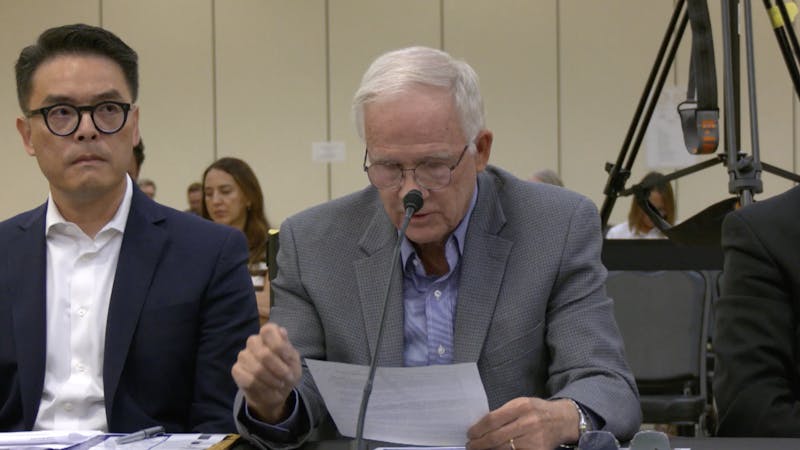Rice settles financial aid lawsuit for $33.75 million

William Liu / Thresher
Rice reached a $33.75 million settlement in the financial aid “cartel” lawsuit, according to Friday court filings. Rice denied wrongdoing in the settlement.
The class action lawsuit, filed in 2022, accuses Rice and 16 other elite universities of illegal price-fixing that decreased aid to students. Ten universities have now settled for a cumulative $284 million.
The 17 universities collaborated on “principles” for calculating financial need, which was permitted under Section 568 of the Improving America’s Schools Act of 1994 for need-blind universities. However, the plaintiffs allege that some of the 17 defendant universities were not truly need-blind, and others — like Rice — should have known that their peers did not qualify for inclusion into the eponymous 568 Presidents Group.
In a statement to the Thresher, Rice denied unfairly limiting need-based financial aid.
“Rice is committed to transforming the lives of students and supporting Owls of all socioeconomic backgrounds through its generous, loan-free financial aid programs and need-blind admissions,” Jeff Falk, the assistant vice president for strategic communications, wrote. “The university never conspired to decrease aid for its students.
“The Rice Investment, our signature program to meet the needs and potential of all students, will continue to provide scholarship and grant opportunities to deserving students,” Falk added.
Rice students who enrolled after Fall 2003 can qualify for the settlement class if they are a U.S. citizen or permanent resident who received need-based financial aid covering some — but not all — tuition, fees and room and board. The average claimant will receive $2,000, according to the Angeion Group, which will administer the settlement. The Angeion Group estimates that some 200,000 students and alumni across the 17 universities may be eligible for the settlement.
Omar Syed, Rice’s general counsel, told the Thresher that Rice settled before trial — like some 95 percent of civil lawsuits, Syed added — to avoid “escalating costs of defending itself in court.” In the filing detailing Rice’s portion of the settlement agreement, the plaintiffs and Rice agreed that the settlement would not be an admission of wrongdoing.
“Importantly, Rice never conspired with anybody to decrease aid for its students,” Syed wrote in an email. “But as the lawsuit went on, it became clear that remaining part of the collective of universities (the defendants in the lawsuit) was not in Rice’s best interests.”
Syed wrote that Rice has insurance for “certain larger liabilities,” and the settlement allows Rice to pay the $33.75 million over two years.
“Rice is also taking other careful steps to make sure this settlement does not impact our students or programs,” Syed wrote.
Syed did not answer a question asking if Rice’s financial aid practices will change.
Ten universities have now settled in the case, styled Henry v. Brown University. The University of Chicago settled first in August 2023 for $13.5 million. Yale, Emory, Brown, Columbia and Duke universities then settled in January for a collective $104.5 million, ranging from $18.5 million to $24 million per school.
Together with Rice’s $33.75 million — which was initially set aside in an October 2023 financial statement — Dartmouth, Northwestern and Vanderbilt universities announced settlements of $33.75 million, $43.5 million and $55 million, respectively.
In all, the 10 universities have paid $284 million — and seven other defendant universities remain.
In a Friday filing, the plaintiffs wrote that they aimed to increase settlement amounts with each successive agreement to “put pressure on the non-settling Defendants to settle imminently or risk having to pay significantly more by waiting.” Syed said Rice agreed to settle the case before Northwestern and Vanderbilt, which is why those universities will pay higher amounts.
The class action lawsuit was filed Jan. 9, 2022, the Section 568 exemption ended Sept. 30, 2022 and the 568 Presidents Group was dissolved Nov. 4, 2022.
Under Section 568, antitrust restrictions were waived for fully need-blind universities so they could “use common principles of analysis” in determining need-based aid. However, some universities were need-aware in certain cases, such as waitlist admissions, so the plaintiffs claimed that any 568 Presidents Group agreement broke the exemption.
In a motion to dismiss the lawsuit filed in April 2022, the defendant universities argued that “need-blind schools retain Section 568’s protection where, as here, they are not plausibly alleged to have actual knowledge that other member schools are not need-blind.”
However, in a July 2022 “statement of interest” in the case the U.S. Department of Justice wrote that agreements between need-blind and need-aware universities are not exempt under Section 568, even if the fully need-blind universities like Rice lack “actual knowledge” that their collaborators are need-aware.
“As Defendants acknowledge, the 568 Exemption covers certain ‘agreements,’ not certain defendants,” the DOJ wrote. “An agreement either qualifies for the exemption or it does not.”
[Feb. 27, 2024 9:00 p.m.] This article was updated with additional information about the settlement.
More from The Rice Thresher

Rice announces Chao College as 12th residential college
Rice announced that the 12th residential college will be named Ting Tsung and Wei Fong Chao College Aug. 19. The college, set to open in fall 2026, will contain nearly 300 on-campus beds.
Dining access fund announced following on-campus unlimited meal swipes
Rice announced new food assistance programs on Tuesday to account for the controversial change in the on-campus meal swipe plan.

Rice disaster prediction model discussed at hearing on deadly Central Texas floods
The House and Senate Select Committees on Disaster Preparedness and Flooding held a hearing on July 31 in Kerrville to address the deadly July 4 flooding in Central Texas. The flooding along the banks of the Guadalupe River killed 108 people, including 37 children. In the charged hearing, Texas lawmakers and flood survivors criticized the local response to the disaster.


Please note All comments are eligible for publication by The Rice Thresher.